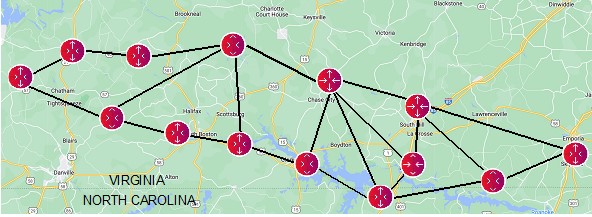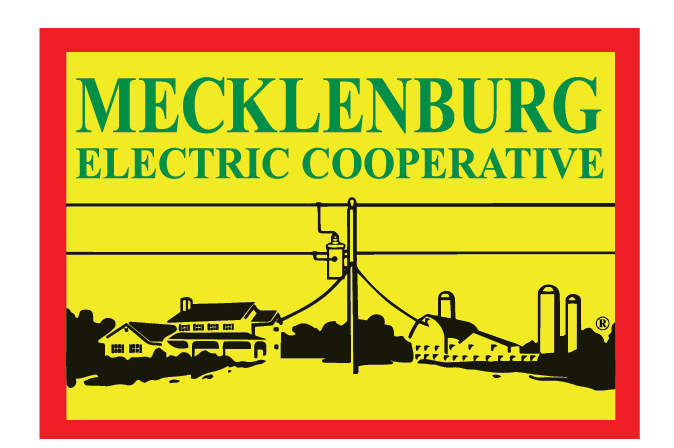Mecklenburg Electric Cooperative (MEC) serves 31,000 member accounts over 4,511 square miles in nine Southside Virginia and five northern North Carolina counties. Founded in 1938 by farmers and families to ensure that rural residents had access to the same safe, reliable, and affordable electric service as those living in big cities, MEC is now broadening its mission to provide middle-mile infrastructure for broadband services.
History repeating itself—for good
Back in the 1930s, with government support from the Rural Electrification Act of 1936, electric cooperatives were instrumental in bringing essential electricity to rural communities. Today, cooperatives like MEC are playing a similar role in narrowing the digital divide.
To date, high-quality broadband has been lacking in rural America because it can be challenging for incumbent providers to build a business case for deployment in sparsely populated areas. That’s why electric cooperatives, armed with government funding, are once again stepping up to meet a critical need by building out the middle mile for essential broadband connectivity to their communities.
While middle-mile networks don’t directly provide internet access to residences and businesses, they do supply the crucial fiber-optic infrastructure between an internet service provider and a regional internet backbone. Without the middle mile, last-mile connectivity isn’t possible. And without internet access, myriad opportunities in education, healthcare, economic development, entertainment, and more are lost.
Seizing opportunities
MEC operates an electric distribution system over which massive amounts of data traverse every day. To efficiently handle the current traffic load and prepare for future demands, the cooperative set out to upgrade its aging Operational Technology (OT) to the latest smart grid technology. Smart grids allow electric providers to monitor and manage electric usage for more efficient electricity transmission and outage detection. The network modernization effort will enable MEC to improve the quality, reliability, and capabilities of its electric service.
But the utility didn’t stop there. During planning, MEC recognized that it can also utilize the network solution to deliver a middle mile to meet the broadband needs of its members. “Mecklenburg Electric’s mission is to provide services that enhance the quality of life for its members, and access to broadband is absolutely essential to thriving in today’s digital society,” said Dwayne Long, vice president of information technology at MEC. “During our network deployment, we will pass tens of thousands of homes, businesses, and organizations, and we found it unthinkable to miss the opportunity to extend this fiber resource to our communities.”
 MEC network footprint
MEC network footprint
Broadband services in MEC’s service territory will be delivered through its subsidiary EMPOWER Broadband.
Choosing Ciena
Because MEC’s network must serve two purposes—ultra-low latency connectivity for mission-critical electric services and high-speed connectivity for broadband traffic—the cooperative required a solution capable of aggregating OT and broadband traffic onto a converged, modernized middle-mile network with quality-of-service capabilities for the two traffic types.
For these reasons, MEC selected a network solution from Ciena. The utility is utilizing Ciena’s Universal Aggregation solution, including the 8114 Coherent Aggregation Router and 5160 Service Aggregation Switch, to build a scalable, converged 100G–400G middle-mile backbone for power delivery and broadband middle-mile aggregation. In addition, MEC is leveraging Ciena’s Manage, Control and Plan (MCP) domain controller to gain complete visibility into, and centralized software control of, the network.
Benefits to MEC:
Improvements to existing electrical system: MEC gains improved usage monitoring with N x 100G scalable bandwidth capacity between power system substations, as well as maximum service availability with real-time visibility of electricity demands and detection of system faults.
New middle-mile network: High-capacity, fast bandwidth ensures that MEC’s broadband subsidiary EMPOWER can satisfy the streaming, smart home, remote work, education, and healthcare needs of the community.
Sustainability: Supports MEC’s green energy initiatives such as solar energy and electric car charging.
“Working with Ciena, we are addressing our electric service communications needs as well as delivering middle-mile capability for rising demand for high-speed broadband in our rural regions,” added Long. “Through this initiative, MEC is connecting the unconnected, making it possible for our members to take full advantage of the countless economic and social opportunities that broadband affords.”
For more information about Mecklenburg Electric Cooperative, visit http://meckelec.org





